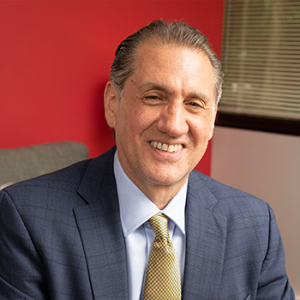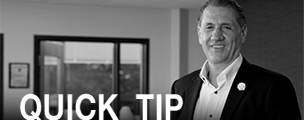Helping clients achieve ‘true success’
Helping clients achieve ‘true success’


Daniel J. Friedman • Farmington, CT
WMGNA Tax-Out Financial Solutions • Wealth Management Group of North America LLC
Read full biography below
Proactive Advisor Magazine: Dan, please talk about the evolution of your firm’s distinct business model.
I have had a lifelong love of sports and have played basketball most of my life. Basketball was actually how I met my future business partner. I was working in the 1990s for a Guardian general agency and played in a basketball league at the West Hartford JCC, where I met Brian Beck. We were both interested in founding a firm with a new approach to guiding clients. We thought that the financial planning we were both doing was not focused on the right issues and, frankly, was too sales-oriented in terms of its outcomes. We consulted with several thought leaders in the industry and concluded that offering comprehensive tax planning could be the gateway to building deep financial-planning relationships with clients and truly adding value.
In 1995, we founded Sound Financial Strategies (SFS) with a different model: a monthly subscription service that included taxes prepared by highly qualified CPAs. Our mission was simple: to be a “one-stop” tax- and financial-management firm that coordinated all our client’s financial matters.
The business model worked well, both in terms of growth and in meeting the financial needs of our clients. We began expanding into other states—now 27 in total. We changed the company’s name in 2000 to Wealth Management Group of North America LLC (WMGNA). On our 25th anniversary, we rebranded to WMGNA Tax-Out Financial Solutions to better match what we do. We all know that taxes are a fact of life, but it is an area overlooked by many financial advisors. Our model remains the same, although we have refined it over the years. We work with professionals such as CPAs, lawyers, bankers, insurance specialists, and money managers to help develop strategies for our clients that enable them to make smarter choices with their money—across all areas of their lives.
Describe your broad financial-planning process.
 We have an expression at our firm that we share with clients: “Everything you do affects your taxes, and your taxes affect everything you do.” Tax planning and strategies across all elements of the financial and investment plan are the cornerstones of our process.
We have an expression at our firm that we share with clients: “Everything you do affects your taxes, and your taxes affect everything you do.” Tax planning and strategies across all elements of the financial and investment plan are the cornerstones of our process.
It puzzles us how anyone providing financial guidance to clients can make recommendations without closely examining a client’s tax returns and overall tax situation. This is like a doctor saying they are going to give you a thorough physical and then not starting with your vital signs. All too often, people work with someone to receive guidance on their finances and too little information is shared with the advisor. In addition to a thorough discovery process, beginning with a tax assessment, we also want to probe many qualitative areas with a client. We ask questions such as, “How have you handled financial decisions in the past? What is your biggest challenge—financial or otherwise? How much do you think you will need to support your current lifestyle—now and through your retirement years? What is important to you about your money, and how would you like to put it to use? Which people do you most want to take care of?”
These answers and many others, combined with hard data, a risk assessment, analysis of time horizons, and developing concrete objectives in consultation with the client, drive the financial plan. We want to make plans both durable and flexible, having the ability to deal with inflation, possibly volatile financial markets, and higher potential tax liability. We do not provide a boilerplate 70-page document at the end of the process that people will probably neither understand nor ever truly consult.
Our proprietary Tax-Out Financial Solutions Plan covers all the most important planning areas concisely. It is typically 10 to 20 pages, including the appendix. Action steps and deliverables are clearly summarized. For most clients, the plan defines specific objectives, tax-planning and tax-reduction solutions, net-worth and cash-flow analysis, our approach to professionally managed investments, retirement-income planning, risk-management and family-protection strategies, Social Security review, assessment of major asset purchase strategies, 401(k) and pension analysis, long-term-care planning, and multi-generation solutions—which includes legacy planning.
We believe “retirement” is an antiquated term that connotes someone taking Social Security and fading into a sedentary lifestyle. Instead of “retirement,” we refer to that stage of our clients’ lives as “Restylement.” People today want to remain active, whether that means living a robust lifestyle, performing volunteer work, starting a business, or even beginning a second career. We also talk to clients about what we call “true success” as they look to their future. We define this as having a great lifestyle plus money multiplied by the time to enjoy it.
What is your overall investment-planning philosophy?
Rule number one is for our clients not to lose money. Risk management drives our investment planning, along with having an asset-allocation process that meets clients’ objectives and allows them to effectively weather the inevitable volatility of the markets. We never want clients to sell risk assets when they’re going down. During a recent interview, I was asked where I thought the S&P 500 would finish the year. My answer was, “It will either be lower or higher.” We do not attempt to predict specific short-term market action, but we do look to maximize the opportunities that exist. Each quarter, we typically evaluate a client’s current allocation versus their investment policy’s target allocation. In most cases, this theoretically compels us to “sell high and buy low” as we perform this rebalancing for client portfolios.
 We are investment-product agnostic when it comes to building client investment plans. The most important thing is that their customized investment plan strives to deliver on their objectives, risk tolerance, risk capacity, liquidity needs, tax situation and potential exposure, and comfort level. I do not believe in differentiating between “passive” or “active” investments. In a sense, everything we do is actively managed, since we review client allocations frequently, evaluating worst-case scenarios and stress-testing portfolios. I prefer to view our approach as seeking the returns of diversified asset classes in a manner that exposes clients to suitable risk—and as inexpensively as possible. We will supplement that by working with various opportunistic or tactical third-party managers, each of whom might have their own distinct approach and strategies to money management. We work with money managers who have proven track records and whose strategy execution is faithful to their stated objectives. That does not mean they will be 100% right all of the time, but we do think their methodologies enhance the probabilities of our clients seeing a value-added element to their investment plan.
We are investment-product agnostic when it comes to building client investment plans. The most important thing is that their customized investment plan strives to deliver on their objectives, risk tolerance, risk capacity, liquidity needs, tax situation and potential exposure, and comfort level. I do not believe in differentiating between “passive” or “active” investments. In a sense, everything we do is actively managed, since we review client allocations frequently, evaluating worst-case scenarios and stress-testing portfolios. I prefer to view our approach as seeking the returns of diversified asset classes in a manner that exposes clients to suitable risk—and as inexpensively as possible. We will supplement that by working with various opportunistic or tactical third-party managers, each of whom might have their own distinct approach and strategies to money management. We work with money managers who have proven track records and whose strategy execution is faithful to their stated objectives. That does not mean they will be 100% right all of the time, but we do think their methodologies enhance the probabilities of our clients seeing a value-added element to their investment plan.
“Rule number one is for our clients not to lose money.”
How does your firm separate itself from other advisory firms?
Our firm has many points of differentiation, starting with the highly professional preparation of client tax returns and the fundamental focus on tax efficiency throughout our planning process. But equally important is the subscription model itself, which allows clients to actively engage with us on any financial question at any time. We are happy to help clients make well-informed decisions on employee benefits, cash-flow management, real estate purchases, educational funding, leasing or purchasing a car, or refinancing their mortgage, to cite just a few examples.
We pride ourselves on staying actively engaged with clients and on our proactive, forward-looking approach. Candid and frequent communication is at the heart of our practice. By specializing in tax-optimization strategies with ongoing financial planning, we strive to make sure our clients’ financial solutions are in continuous alignment with their life situations and goals. This includes both a diverse array of individual clients and families and business-owner clients, whose unique needs are effectively addressed by our process, strategies, and implementation planning.

Daniel J. Friedman is a founding partner and CEO of WMGNA Tax-Out Financial Solutions, an advisory firm headquartered in Farmington, Connecticut, with an office in Boca Raton, Florida. Mr. Friedman says, “Our firm’s mission is to be a ‘one-stop’ tax- and financial-management firm that coordinates all our client’s financial matters.”
Mr. Friedman was raised in West Hartford, Connecticut. He has a younger brother and sister, as well as two stepsisters and a stepbrother. His father was an engineer, and his mother was a speech therapist. After his mother remarried, she worked as an office manager for a company founded by Mr. Friedman’s stepfather. Mr. Friedman says, “All three of my parents had a profound influence on my life. I was also close to my grandfather, a successful businessman and entrepreneur.” He says he was a member of his high school’s varsity tennis team and enjoyed playing basketball and baseball. He was also active in his temple. He graduated from Denison University in Ohio with a Bachelor of Arts degree in history. He was a member of a fraternity and helped found a Jewish student union on campus.
Mr. Friedman began his financial-services career at a general agency for Guardian Life. In addition to insurance products and services, Mr. Friedman gained valuable experience with investments, financial planning, and benefits and pension planning. He and his future partner, Brian Beck, jointly explored different business models, “seeking out thought leaders in the industry.” They determined that a subscription model grounded in tax planning would be a distinctive and valuable way to serve clients and their diverse financial-planning needs. Together, they founded their firm in 1995, which has since become WMGNA Tax-Out Financial Solutions.
Mr. Friedman enjoys historical biographies, traveling, working out, and spending time with his three sons. He and WMGNA are active supporters of the West Hartford community, with an affinity for education, business, and sports programs. He is also a supporter of the Miracle League organization. He and WMGNA have a robust partnership with the University of Hartford’s Barney School of Business through internships, speaking engagements, and events. In 2013, Mr. Friedman was appointed to serve on Connecticut’s State Insurance and Risk Management Board. His financial blog has been featured on NerdWallet’s “Advisor Voices” and has been nationally syndicated. Mr. Friedman has been interviewed by many media outlets.
Disclosure: Securities offered through Triad Advisors LLC, member FINRA/SIPC. Advisory services offered through WMGNA LLC, a registered investment advisor. WMGNA and Triad Advisors are separate and unrelated companies.
Photography by Jeffrey Yardis
New this week:

Robust and proactive investment planning for clients
Daniel J. Friedman is a founding partner and CEO of WMGNA Tax-Out Financial Solutions, an advisory firm headquartered in Farmington, Connecticut. He says his clients’ investments are managed “individually, transparently, and proactively” according to the following four-step process:
- Define the investments. Mr. Friedman says his firm partners with some of the best providers in the investment industry. The firm’s TAMP relationship provides research and access to thousands of investments that were previously only available to the institutional community. The firm also has access to sophisticated hedge funds at significantly reduced minimums.
- Create a well-diversified portfolio that meets the client’s investment objectives, paying close attention to potential tax exposure. The firm’s independence and dual registration as an RIA and brokerage gives Mr. Friedman and other advisors at the firm the freedom to be investment-product agnostic and to seek opportunity within a robust universe of investment products and strategies.
- Guide clients to appropriate investments and strategies. The firm works with clients to select investments and strategies that help meet the clients’ goals, while also being focused on their risk tolerance, risk capacity, liquidity needs, tax situation, and comfort level.
- Monitor and maintain client investments. This includes making changes proactively based on progress versus objectives, the market environment, portfolio drifts, changes in money managers, and new opportunities that become available.

